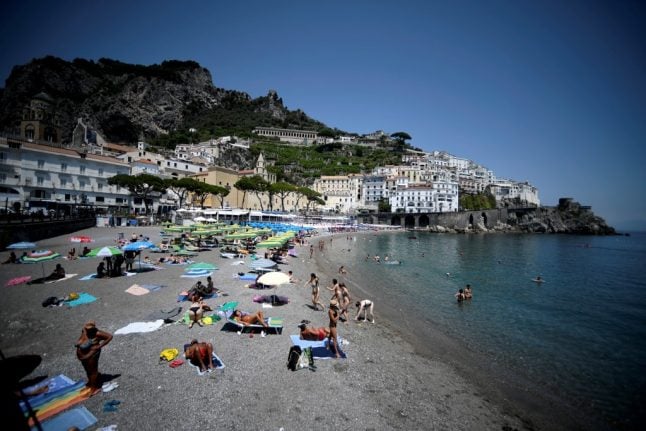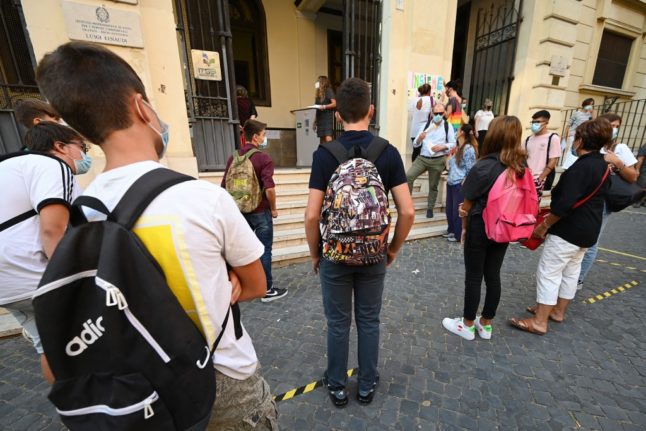Tourism has restarted in Italy (from some countries at least) after the coronavirus shutdown. The reopening no doubt comes as a huge relief to holidaymakers as well as to those working in the country's badly-hit tourist trade – but it also comes with plenty of changes.
If you've got a trip to Italy coming up you might be wondering, understandably, what exactly will await you when you arrive. What rules will you need to folow? Will Italians be pleased to see you? And is it actually safe to travel? Here's a look at what to expect.
What's it like visiting Italy right now?
Unusually quiet, at least if you're visiting a major international tourism hotspot such as Venice, Rome, Florence, the Amalfi Coast or Capri.
Many of The Local's readers living in Italy have taken the chance to visit the country's most famous (and normally overcrowded) sights since lockdown eased, and report that they're unusually peaceful, making a visit to one of these famed destinations an extra-special experience at the moment.
READ ALSO:
- Lessons from a crowd-free weekend in Venice
- 'No segways, no crowds, and only Italian spoken': Here's what visiting Rome is like right now
- The parts of Italy where fewest tourists go
Readers in the northern regions of Italy tell us there are plenty of visitors arriving by car this year from Germany, France, and beyond. Germans make up by far the largest percentage of visitors to Italy each year, with many driving to visit northern regions such as Veneto and Trentino-Alto-Adige.
Apparently Italian tourism figures are down this year, unsurprisingly, although you wouldn’t know it from the number of foreign cars on the motorway, lots of Germans, Austrians, Dutch, Scandinavians and even the odd British car, like every year.
— George Young (@GiorgioGiovane) July 21, 2020
This might lead you to think that the south of the country would be quieter. However, if you're visiting a holiday destination beloved by Italians, such as the famous beaches of Puglia or Sicily, you can expect many areas to be almost as busy as usual – particularly on weekends.
Do italians want foreign tourism at the moment?
Some readers have asked if they would even be welcome if they were to visit Italy at the moment.
While there have been some reports of hostility towards Italian tourists from the worst-hit Lombardy region travelling in other parts of Italy, we've heard no reports so far of foreign visitors facing difficulties – perhaps unsurprisingly in a country where the economy is so dependent on international tourism.
READ ALSO:
- How important are American tourists to Italy?
- 'We'll be back, but not yet' How people are changing their Italian travel plans this summer
It may all depend on where you come from though, as polls have found concerns are running high about people travelling into Italy from some of of the world's worst-hit countries.
Nearly two-thirds of people in Italy don't want American tourists returning this summer due to the high infection rate in the US, while 44 percent are opposed to visitors from the UK, according to one study
Is my trip likely to go ahead?
The first thing you'll be keeping an eye on is of course whether Italian rules, and your own country's rules, will allow you to travel (more details on that in a separate article here).
Many countries have now removed their travel restrictions on Italy. Although Italy was the first country in Europe to be hit by the coronavirus crisis, and suffered one of the highest death tolls, the country now seems to have the outbreak under control with health precautions being carefully enforced across the country.
The virus hasn't disappeared – there were 282 new Italian cases reported today, Wednesday 22nd July, according to official government figures. But the infection rate continues continues to drop overall and health authorities say the emergency phase has passed.
Unless the situation dramatically worsens, it seems unlikely that other countries will impose a new ban on travel to Italy anytime soon.
What happens when I arrive at the airport in Italy?
When you land in Italy you may have your temperature checked by health personnel at the airport.
Passengers from non-Schengen/EU countries, even if in transit in a Schengen/EU state, must also complete the self-declaration form for re-entry to Italy, which can be downloaded here.
And visitors to some regions, including Sardinia, will also need to register with local authorities using a separate form.

Photo: AFP
Will I have to quarantine or follow any safety precautions?
When it comes to quarantine, it depends on which country you're travelling from. (You can find full details of current travel restrictions here.) But if you're travelling from within the EU and Schengen area, which for these purposes also includes the UK, you won't face any restrictions and there is no requirement to quarantine.
But travellers to Italy should also be aware of safety measures which might differ from those at home. For example, masks must be worn in shops and on public transport across Italy, and social distancing rules are still in place.
Find more details on the current safety precautions in place in Italy here.
You'll also need to check whether the region you are travelling to has its own additional rules in place: for example, local authorities on the island of Capri have recently said that masks must be worn outdoors on weekends throughout July.
Your hotel or travel agent should be able to advise on this, or you can check the regional government's website.
Most Italian businesses do seem to enforce the rules strictly, as police checks are common and there are steep fines – both for business owners and for any customers seen breaking rules on the premises.

Photo: AFP
Can I go to to beaches, museums, and restaurants as normal?
You can go to all of these places – but it's unlikely to be as normal.
While most restaurants, beaches and tourist attractions are now open for business, they're likely to be much quieter than usual, and will have rules in place to ensure social distancing.
Most businesses now either recommend or require advance bookings, and some may ask customers for their contact information in case tracing is required.
Italy's normally packed museums and historical sites have reopened with strict measures in place to control crowds and reduce to risk of contagion, and are also experimenting with everything from bluetooth apps to vibrating necklaces intended to help visitors stay away from each other, so don't be surprised if you're asked to use something like this.
Meanwhile, though the Italian government has also imposed social distancing rules on beaches – including a ban on beach games and on gatherings of four or more people, and a requirement for people to stay at least one metre apart at all times – this has proven impossible to enforce on many public beaches (spiagge liberi) and you can expect any such beaches in areas popular with Italians to be quite crowded, at least on weekends.
The rules are easier to enforce at private beach resorts and lidos. Some have spaced out their deckchairs this summer – but not all are taking distancing rules seriously.
I found the same at the beach in the Maremma in Tuscany yesterday: no masks and menefreghismo about distancing. Luckily, the beach is long and there is a lot of space at one end.
— Andrew Frisardi (@andrewfrisardi) July 10, 2020
Hotels too are following extra safety precautions and are likely to require you follow social distancing rules, wear masks in public areas, and to “check in online” – requiring guests to send identification details, such as pasport or ID card details, ahead of their arrival. This measure is intended to reduce contact, as hotel staff won't need to touch documents – however it also speeds up check-in time considerably.



 Please whitelist us to continue reading.
Please whitelist us to continue reading.
Member comments